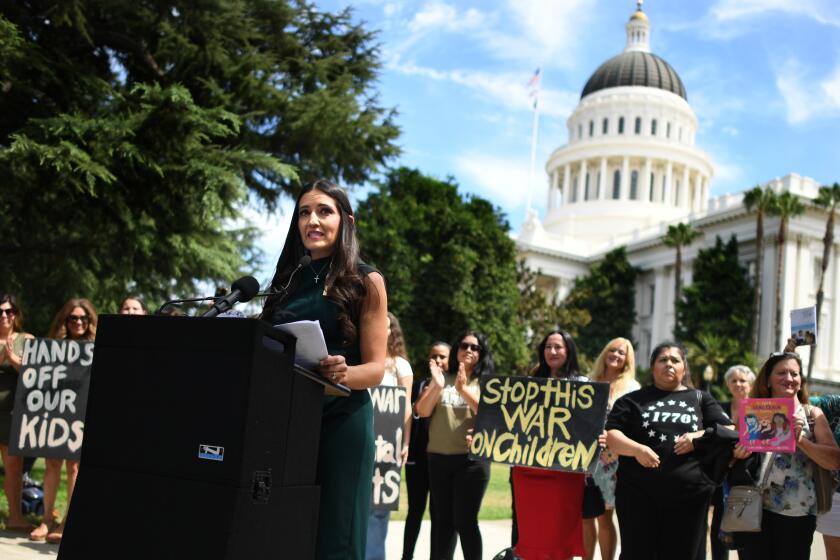‘Kids are having to use their deadname’: Students say gender policies make schools feel unsafe
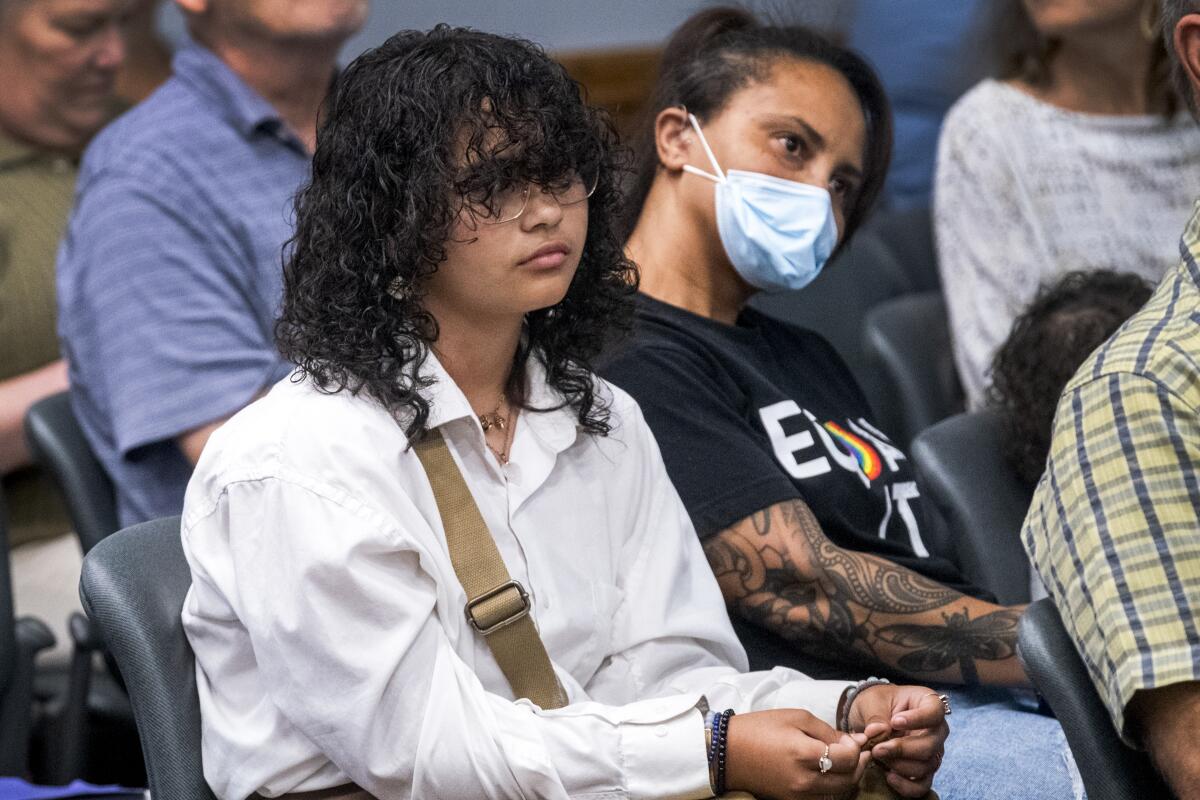
- Share via
Many students consider them “forced outing” policies. And they are already creating fallout.
The recent spate of regulations passed by school boards in conservative pockets of California requiring schools to notify parents if a student does something to indicate gender nonconformity is seeping into campus culture in ways some students describe as dangerous and repressive. And the students most affected, they said, are those who have valid reasons for not yet being open with their families about their exploration of gender identity.
“Multiple trans kids are having to use their deadname,” said Max Ibarra, a high school senior in the Chino Valley Unified School District in San Bernardino County, referring to a student’s birth name before they identify as transgender. “They can’t start their new school year by being themselves, because if they do, they will be outed to their families, and there are many cases where that’s not safe.”
Chino Valley Unified in San Bernardino County in July became the first district in the state to adopt a policy requiring schools to inform parents if a student appears to identify as transgender or gender-nonconforming. Under Chino Valley’s policy, district staff are required to notify parents in writing within three days if they become aware of students using names, pronouns or changing facilities such as bathrooms that do not match their biological sex.
Similar policies have since been adopted by other districts across the state: Murrieta Valley Unified and Temecula Valley Unified in Riverside County; Rocklin Unified in Placer County; Anderson Union High School District in Shasta County; and Orange Unified.
Ibarra, who is transgender and uses they/them pronouns, has been open with family and classmates about transitioning. But for many trans students, coming out as gender-nonconforming at school was a haven when their homes were not, Ibarra said, and now they are being “shoved” back in the closet.
In Murrieta Valley Unified, 12-year-old Celeste Stoller has also been open with family about exploring gender identity. Stoller identifies as agender, denoting a person who does not identify with any gender. The district’s new policy, Stoller said, has left students in more tenuous situations in grave fear of being outed for gender nonconformity.
“It could put them into dangerous situations with their family and their households,” the seventh-grader said. “I just don’t think that’s right.”

Students interviewed were baffled and exasperated by the outsized attention being focused on transgender issues in public school districts led by conservative activists, and more broadly as a mainstay of the culture wars taking place in conservative-led states like Florida and Texas, where lawmakers have banned gender-affirming care for minors.
Transgender students make up a tiny fraction of the population. Trans youth make up about 1.9% of California adolescents ages 13 to 17, according to a survey by the Williams Institute at UCLA School of Law, which researches public policy around sexual orientation and gender identity. Nationwide, 1.4% of the age group identifies as transgender, the survey found.
Although the transgender population is not experiencing a marked upsurge, the generation of students currently attending K-12 schools are exploring issues of gender and sexuality in different ways than their predecessors — and are far more open to the use of pronouns that stretch societal norms.
“They don’t subscribe to the idea of gender that other folks might,” said Harvey Feldman, a psychotherapist and founding member of the Gender Diverse Care Coalition of New Hampshire.
Feldman said that Generation Z, those born between 1997 and 2012, see gender as more malleable than previous generations. Gen Z adults are more likely to identify as nonbinary — meaning they don’t identify exclusively as male or female — and as fitting in somewhere on the LGBTQ+ spectrum when compared with older generations, Gallup polling found. They’re also more likely to express comfort with gender-neutral pronouns and to believe official forms should include gender identification options beyond “man” and “woman,” according to a 2020 Pew Research Center survey.
Among the small population of kids who are transgender, Feldman said, many do go to their families first when they come out as gender-nonconforming. But some may prefer to try out pronouns at school, among their peers, for a sense of autonomy. The new policies challenge the bonds of trust between students and school staff, Feldman said.
“What you would see is kids not going to school counselors or school staff at the same rate,” Feldman said. “You’re reducing the likelihood that a child will confide something in you.”
California’s Democratic leaders contend students have clear-cut rights to privacy, even from their parents, when it comes to gender identity. But experts say the legal realities are more nuanced.
Atty. Gen. Rob Bonta and state Supt. of Public Instruction Tony Thurmond have come out in staunch opposition to Chino Valley’s policy and the spate of copycat measures, saying California laws afford students privacy rights on issues of gender, even from their parents. In August, Bonta filed a lawsuit against the Chino district, and earlier this month, a San Bernardino County Superior Court judge granted the state’s request for a temporary restraining order, ordering Chino Valley to hold off on enforcing its new policy while the case moves forward.
Supporters of the parental notification policies argue that parents have a fundamental right to be involved in all aspects of their children’s lives, particularly when it comes to issues such as sex and gender, and that informing parents if a student identifies as transgender is in the best interest of students.
But at contentious school board hearings, students — particularly queer students — have largely spoken out against such policies. Those who are already out to their parents are speaking up at board meetings on behalf of classmates who are afraid.
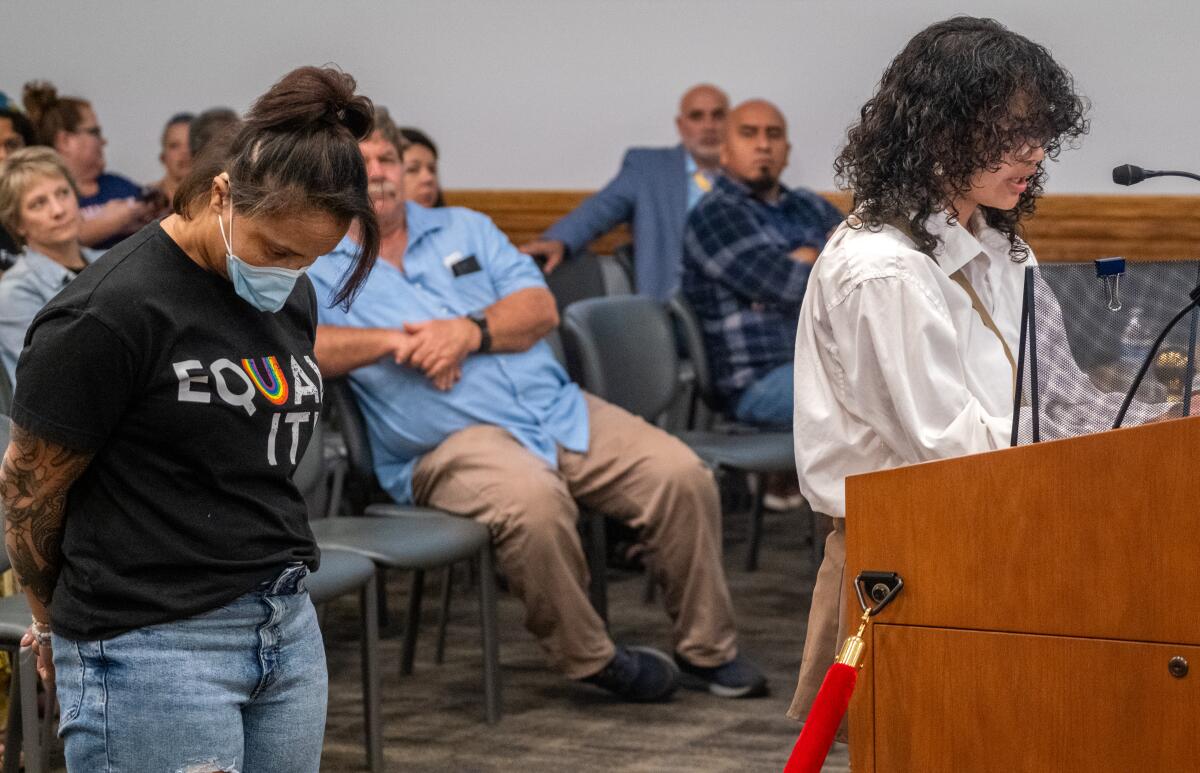
The policies, they say, focus on parental rights when school leaders should prioritize the safety of an acutely vulnerable population of students. Fewer than 1 in 3 young people who identify as transgender or nonbinary report having gender-affirming homes, according to a 2022 national survey by the Trevor Project, a group that advocates for LGBTQ+ youth. More than three-quarters of transgender and nonbinary youth reported experiencing symptoms of anxiety and more than two-thirds said they experienced symptoms of depression, the survey found.
Rey Alexander, a senior in Chino Valley Unified who identifies as nonbinary, said the debate over the new policy has drawn attention and resources away from more pressing issues the district is facing. Alexander and Ibarra are among the student organizers rallying to make it clear they don’t support the effort.
“It’s not a good feeling to know that we are getting sued,” Alexander said.
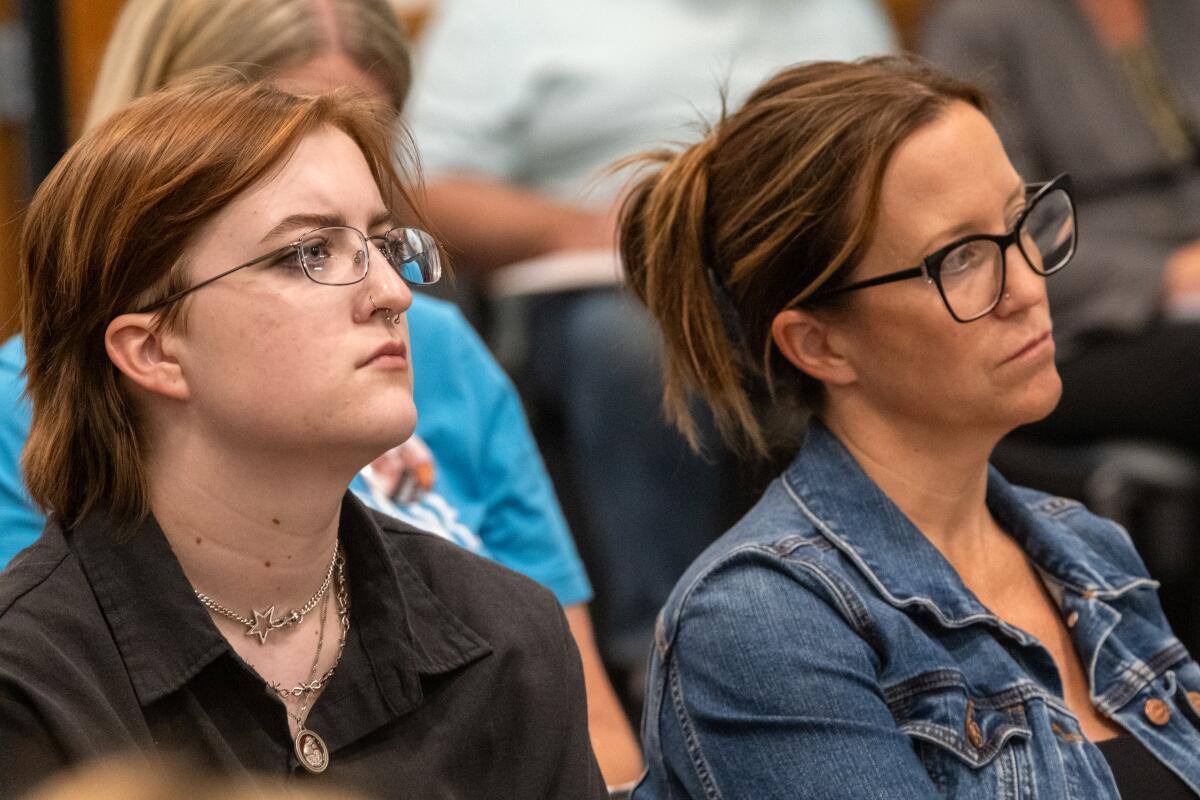
Avery Poznanski, who is also nonbinary and uses they/them pronouns, graduated from Vista Murrieta High in 2021. Poznanski came out as gay to their parents at 14 but did not come out as nonbinary until college — in part because before then Poznanski lacked the right vocabulary. Now a junior at UCLA, Poznanski has found an accepting community that didn’t exist in Murrieta outside of family.
“Both times I’ve come out to my parents about my sexuality and gender, it was not an easy experience, even with parents who are accepting,” said Poznanski, 20. “It’s so personal, but I came to a point where I physically felt it in my body. I cannot even begin to imagine having that feeling and being up against a brick wall.”
Republicans lacking power in California are focusing on local school boards’ policies, setting up a fight with Gov. Gavin Newsom over ‘parental rights.’
Poznanski was stunned to hear Murrieta Valley Unified school board President Paul Diffley dismiss concerns for students’ safety during a heated board hearing about the parental notification policy.
“Yes, there’ll be a couple of parents that are going to explode,” Diffley said at the August meeting. “There are parents that will explode for lots of different things: ‘You didn’t make the baseball team? Whack.’ ‘You couldn’t do this. You couldn’t do that. What’s wrong with you?’ I understand that, but I think on the whole, the majority — and we’re dealing with the majority here — need to have direct, honest contact from their teacher to their parents.”
“We’re talking about safety from physical harm,” Poznanski said of Diffley’s comments. “And you passed the policy and you said that you don’t care.”
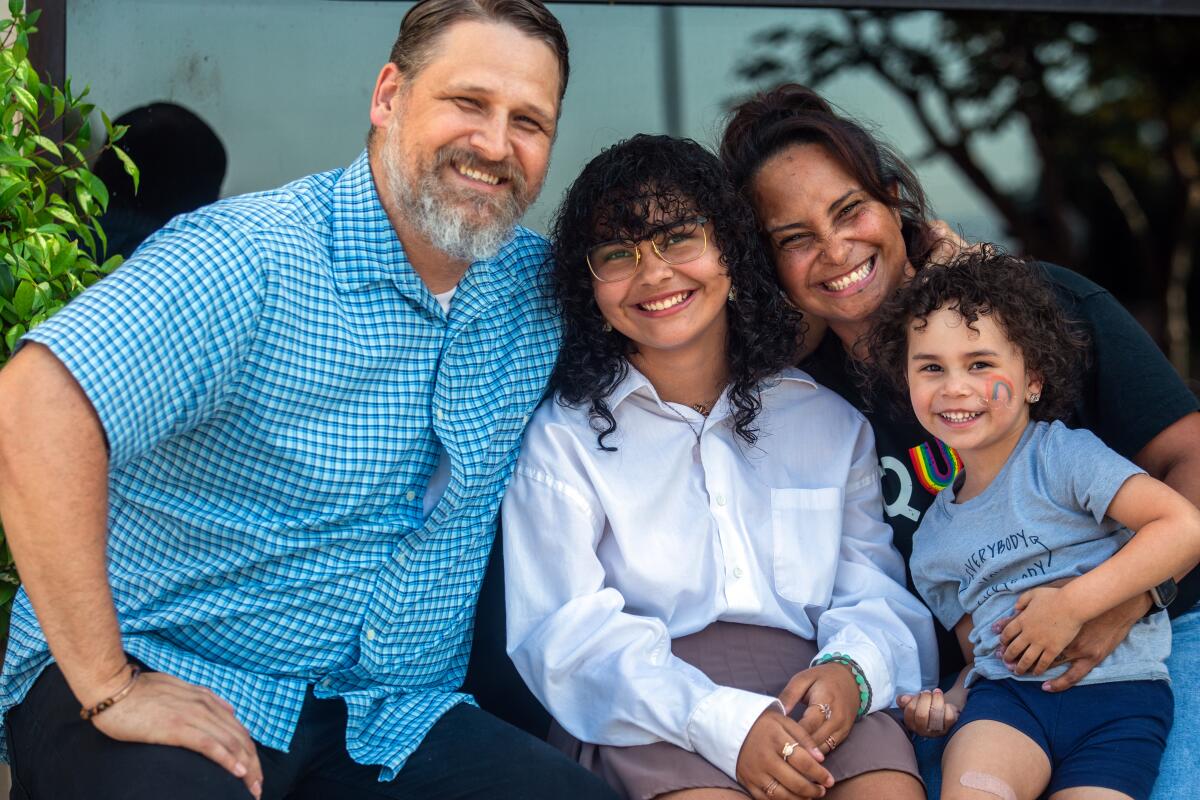
Although Stoller’s parents have been supportive of gender nonconformity, Stoller is haunted by the notion of how it would feel to come out to one’s parents before being ready, while still sorting through the highly personal questions and emotions. It’s a prospect fellow students now face under Murrieta Valley’s new policy.
“A part of the process of coming out to the people you love is being able to have that control over knowing when you’re ready, knowing when you’re prepared to tell them, because if you’re not ready, and they’re told, that can be catastrophic,” Stoller said.
Though open with family, Stoller was not largely out as agender at school. That changed earlier this month, when Stoller decided to approach the lectern during the public comment period at the Murrieta Valley Unified school board meeting to express concerns about the policy. With a voice at first shaky, then growing bolder and louder, Stoller appealed to board members to put their students first.
“You are the adults here, and the children of this school district are leaning on you to ensure that they aren’t put directly into harm’s way,” Stoller said. “All I want is for myself and others to feel safe. But that simply can’t happen when the adults in the situation could only feel comfortable when children fear their teachers, their parents, their peers, and worst of all, themselves.
“I’m scared,” Stoller said. “What does that say about you?”
More to Read
Sign up for Essential California
The most important California stories and recommendations in your inbox every morning.
You may occasionally receive promotional content from the Los Angeles Times.

